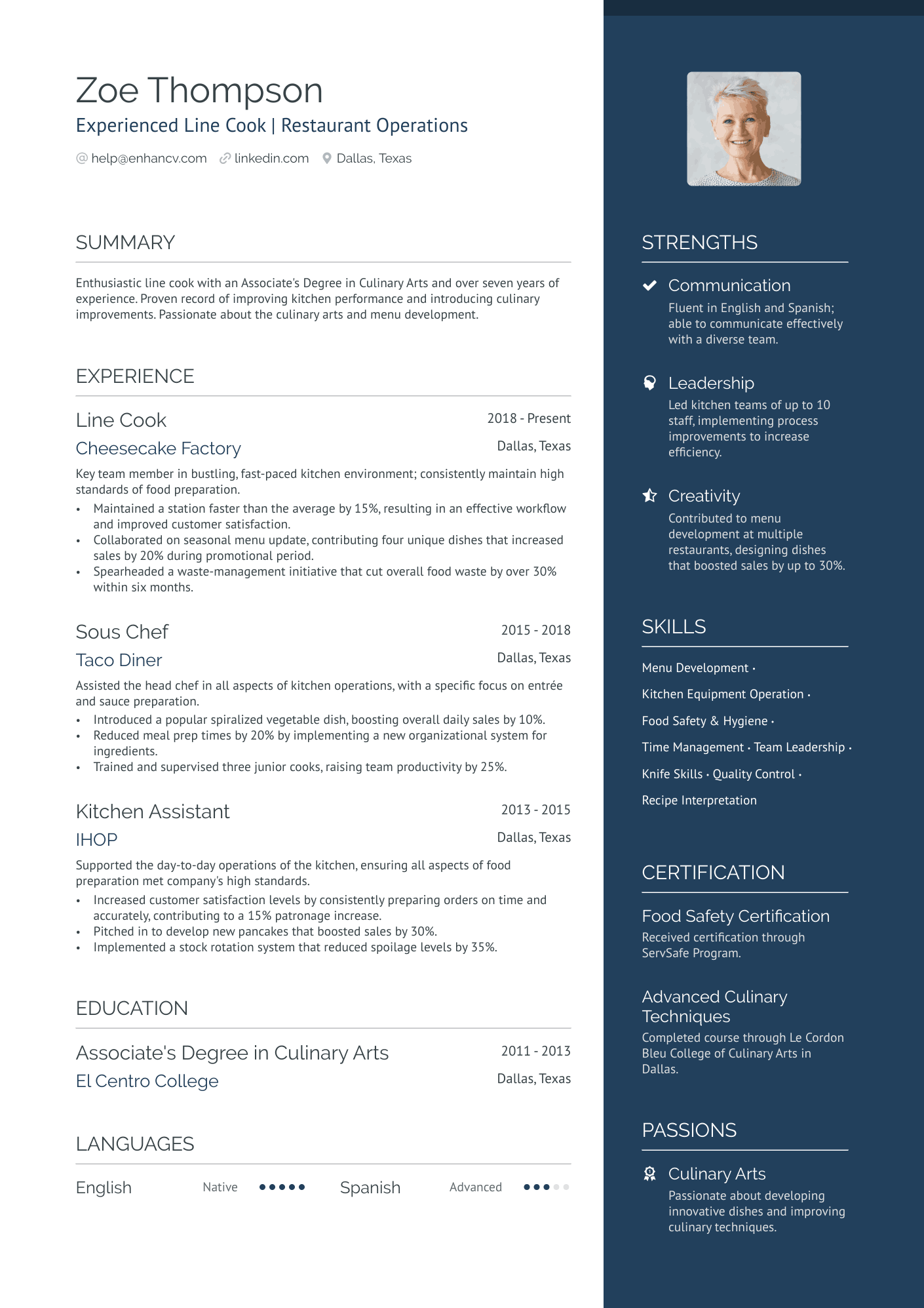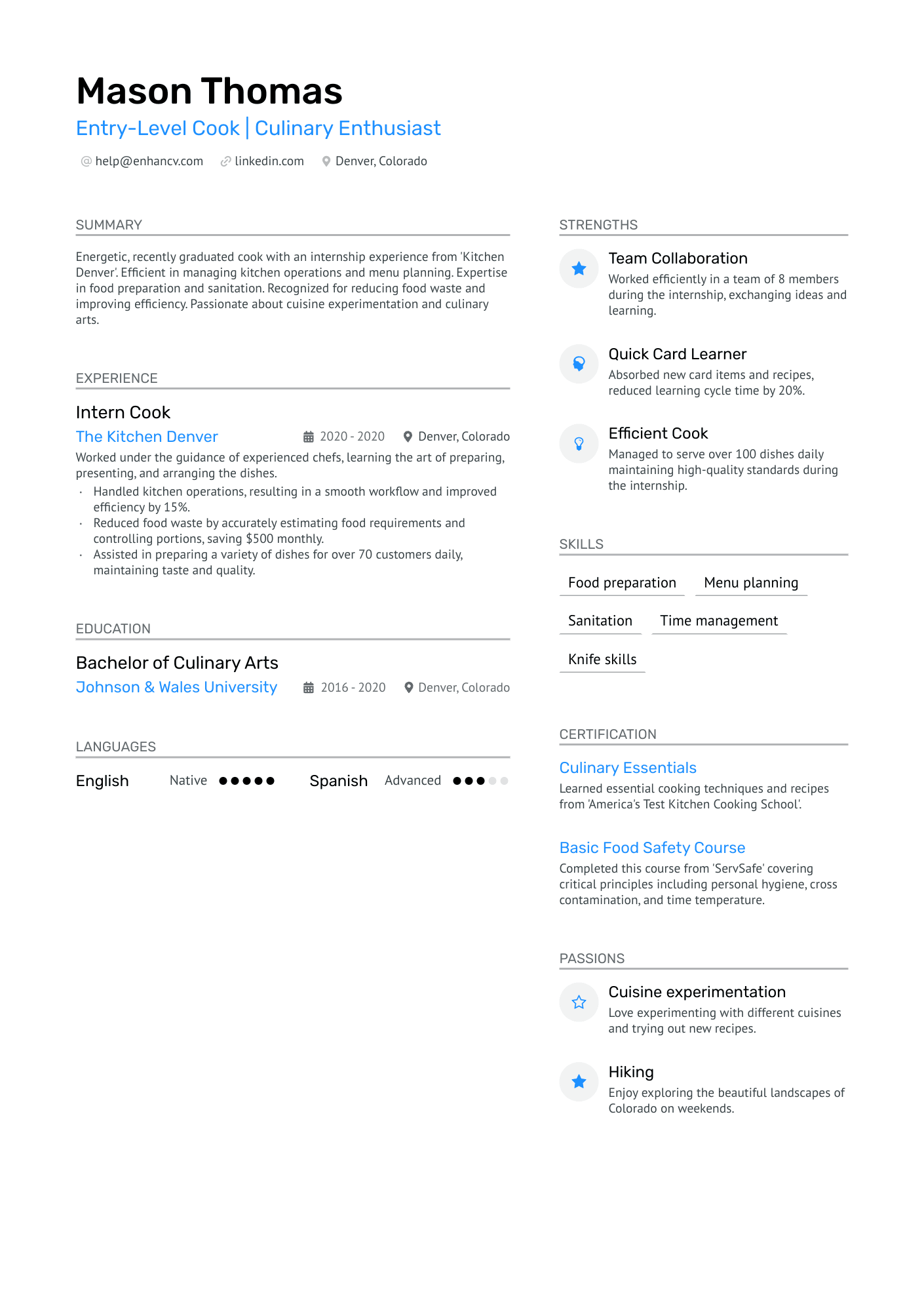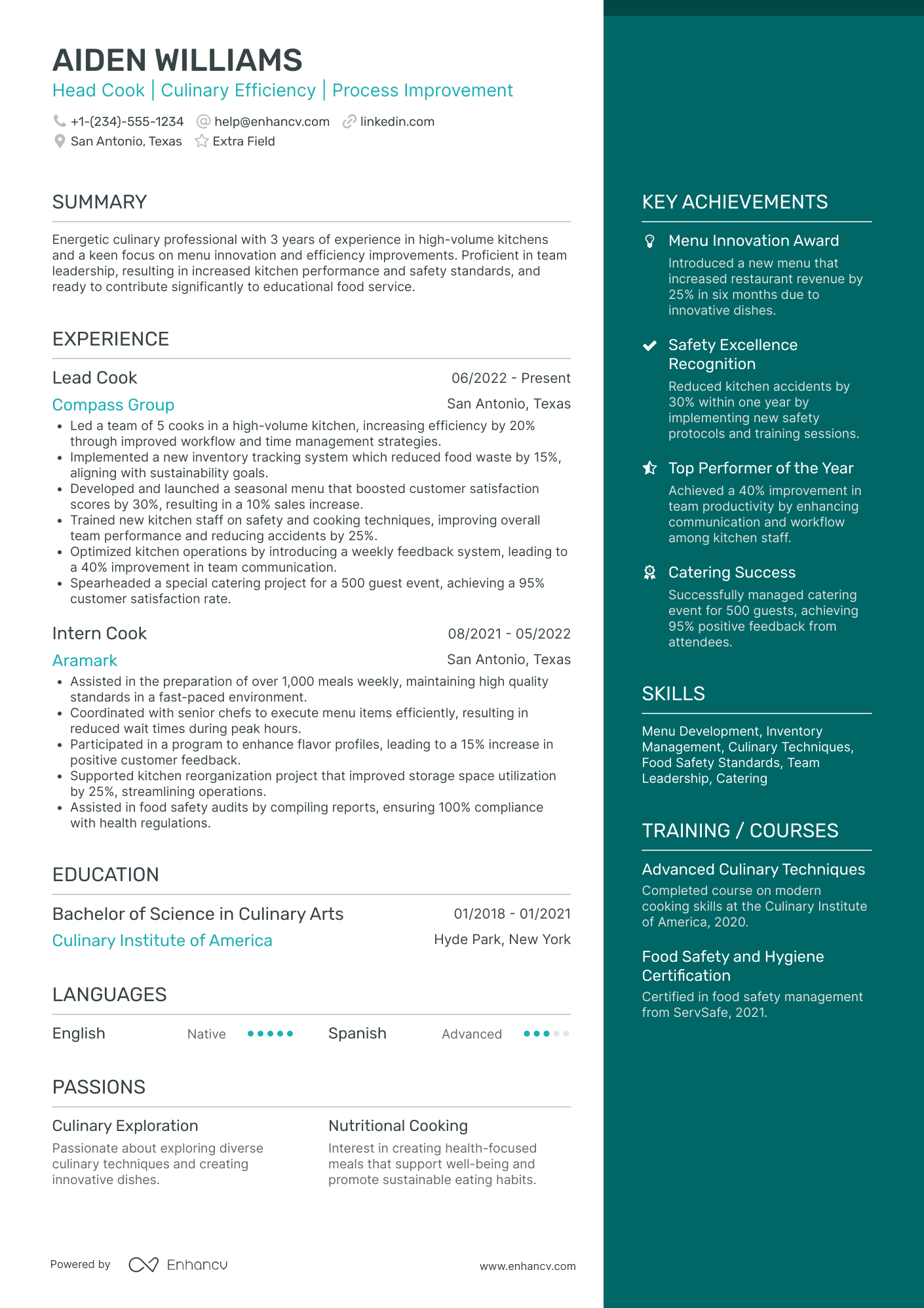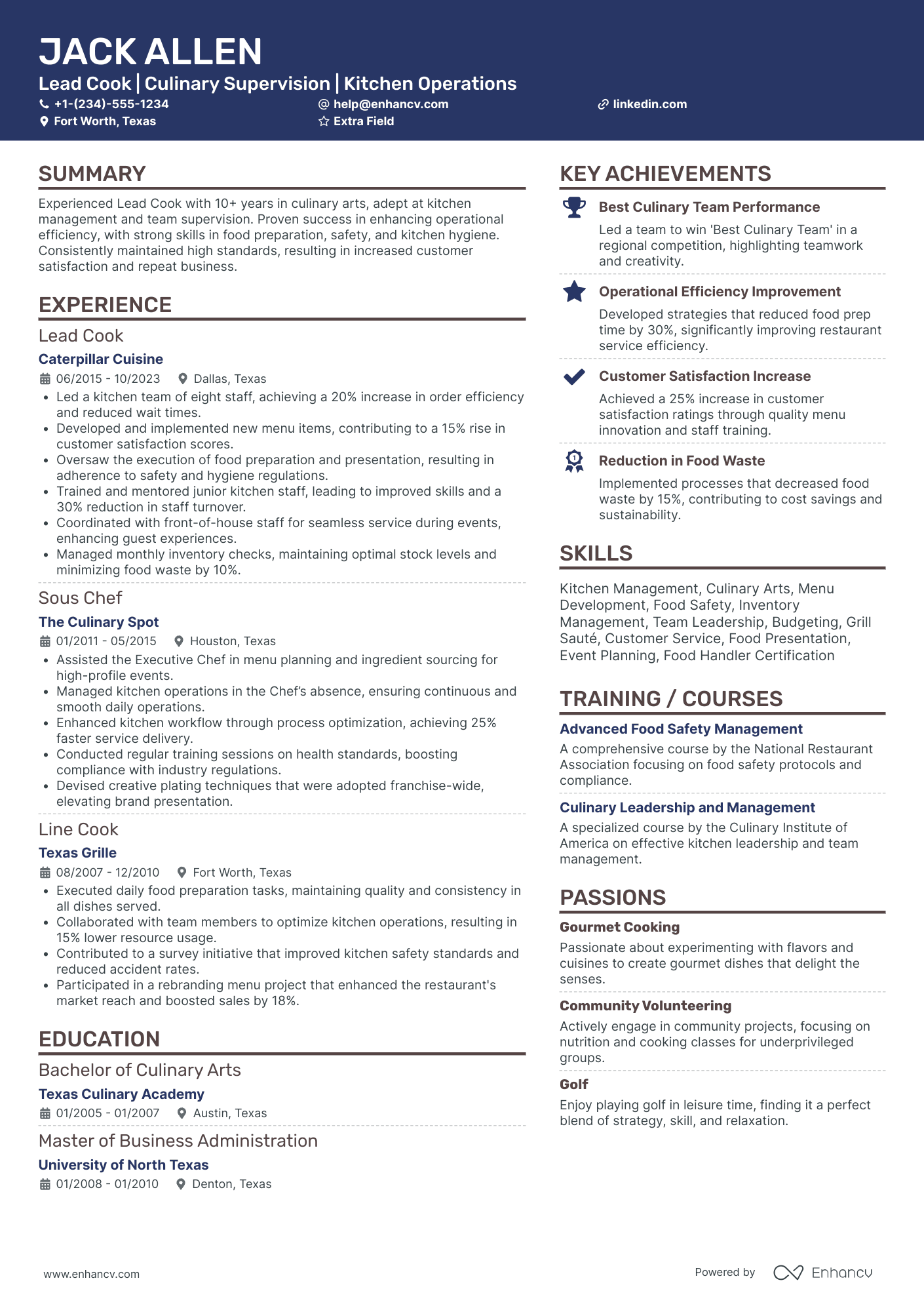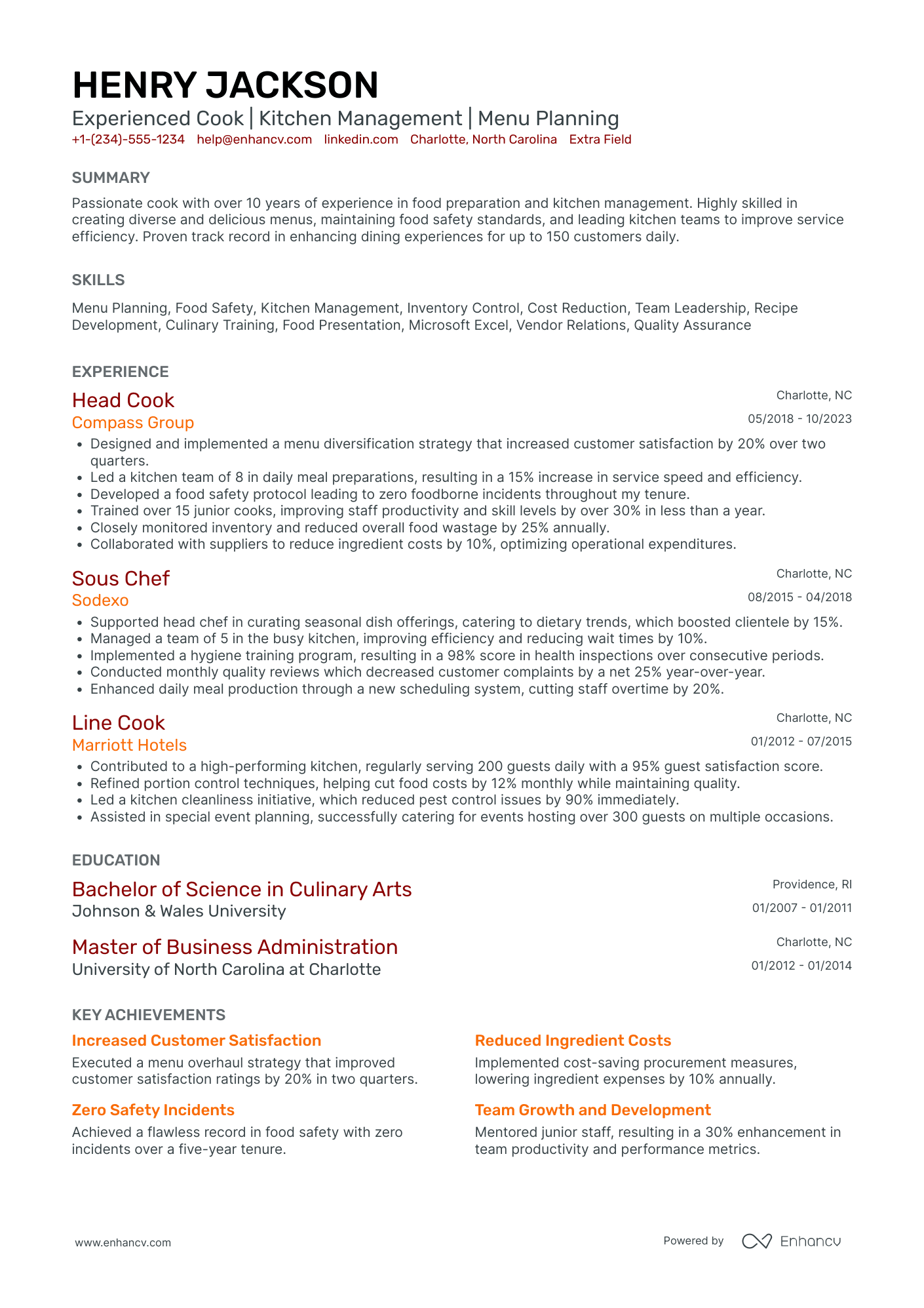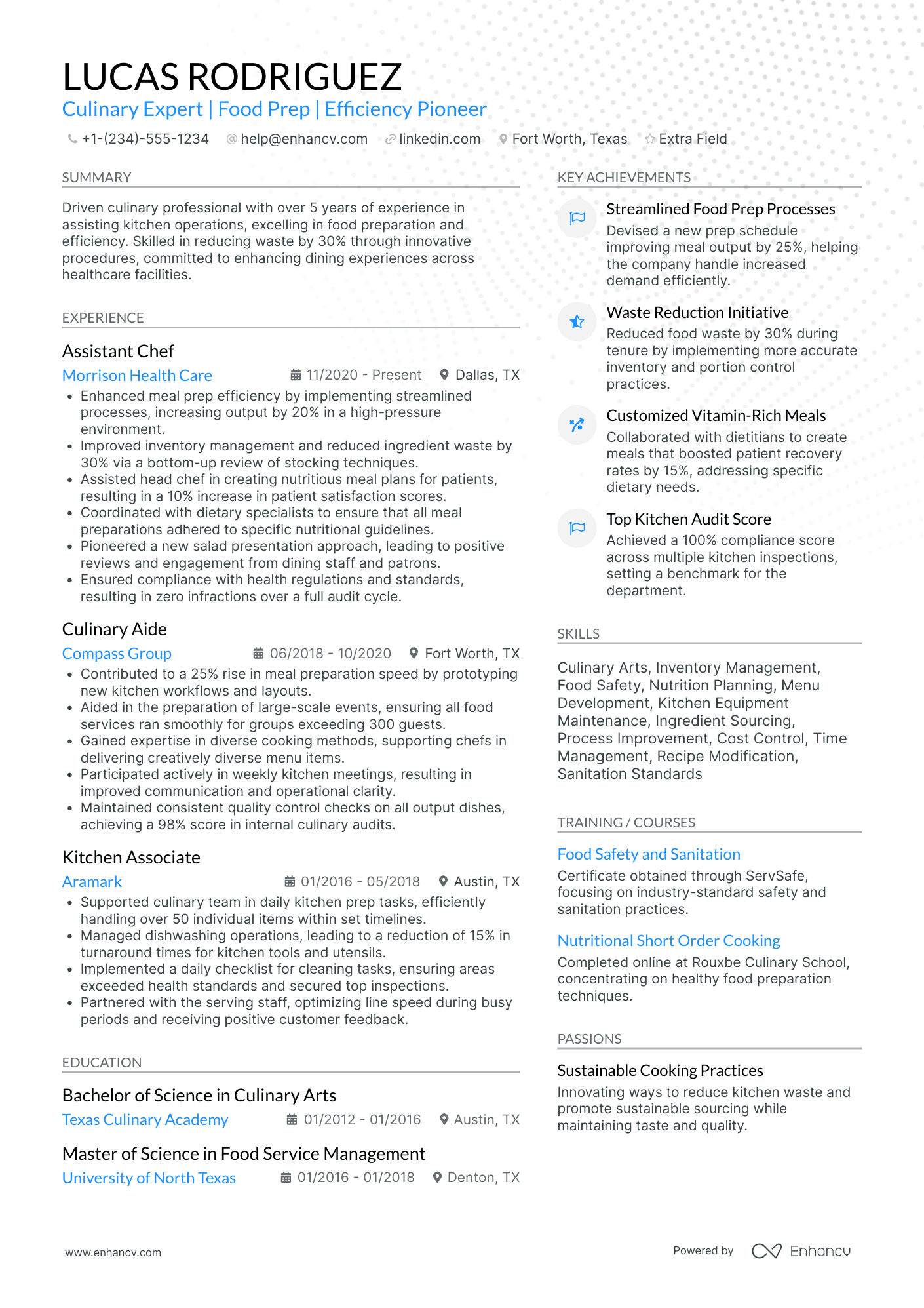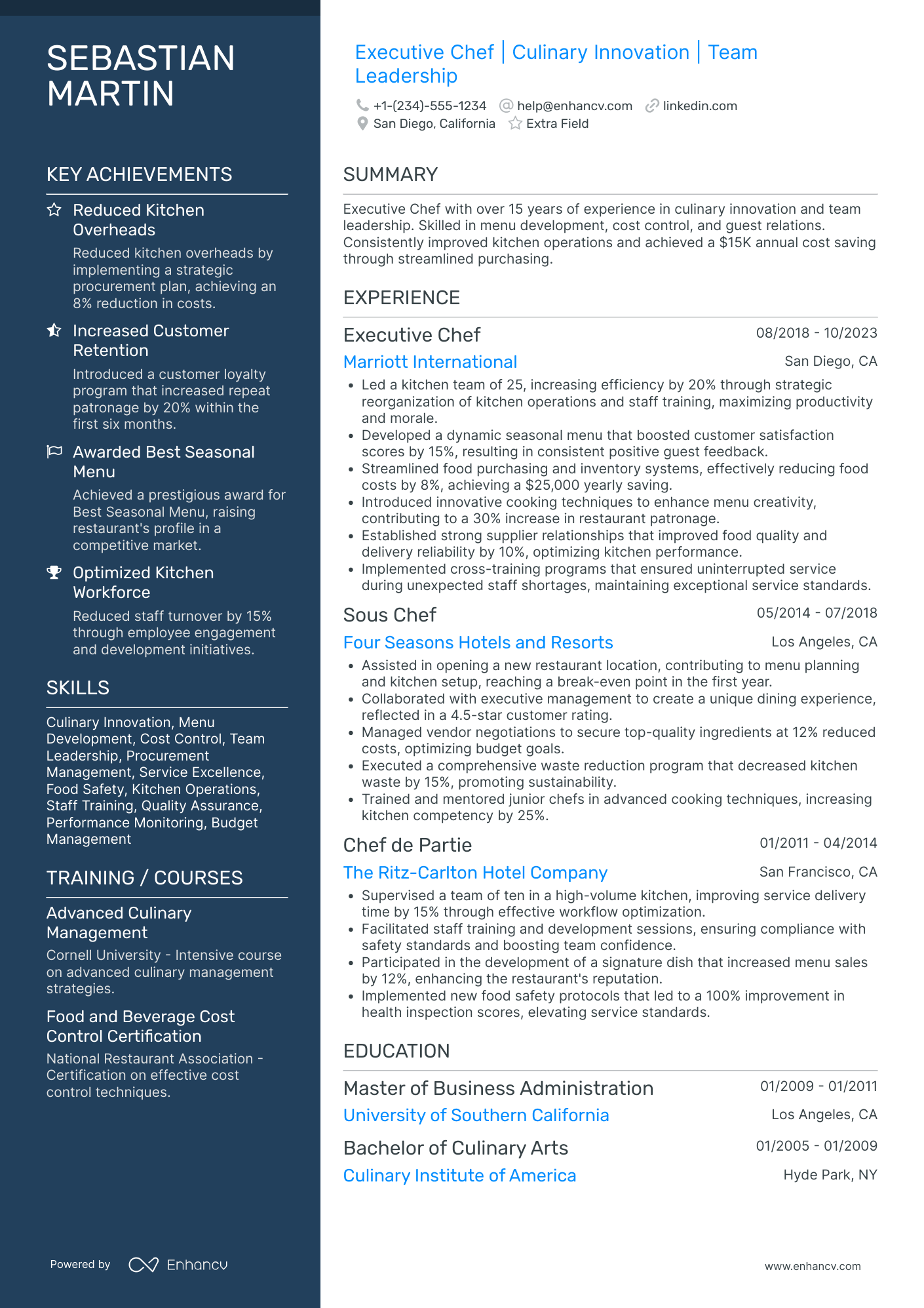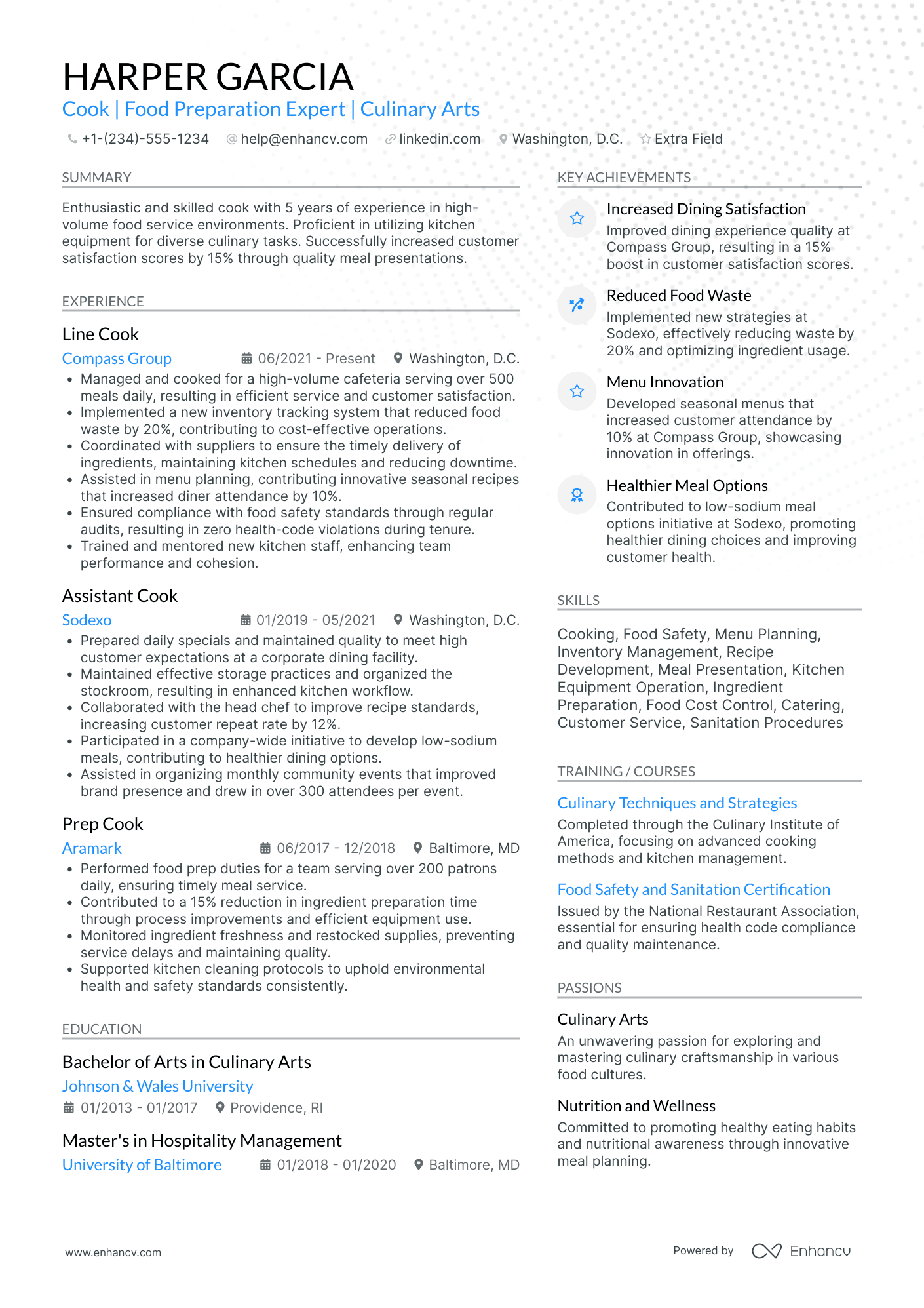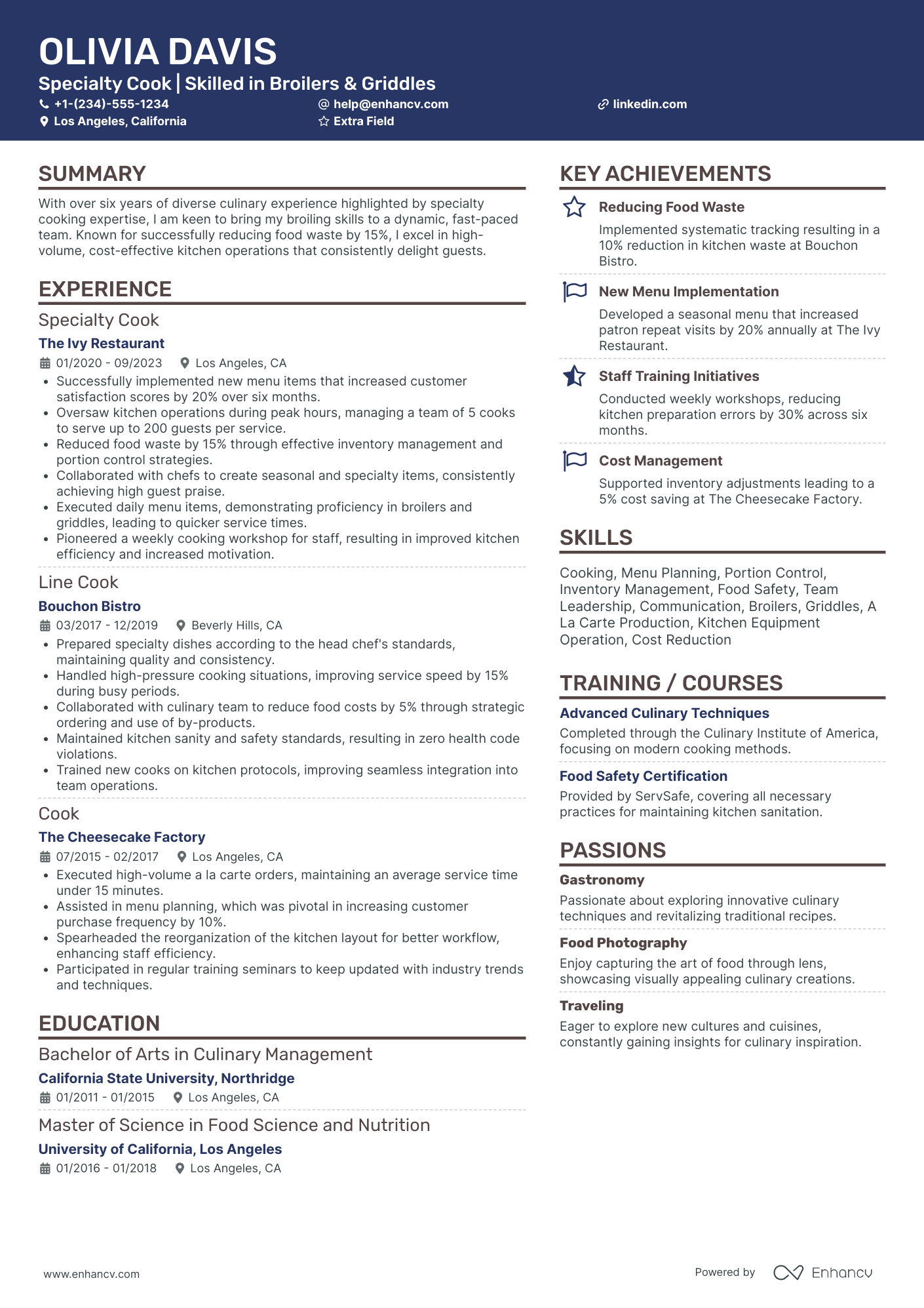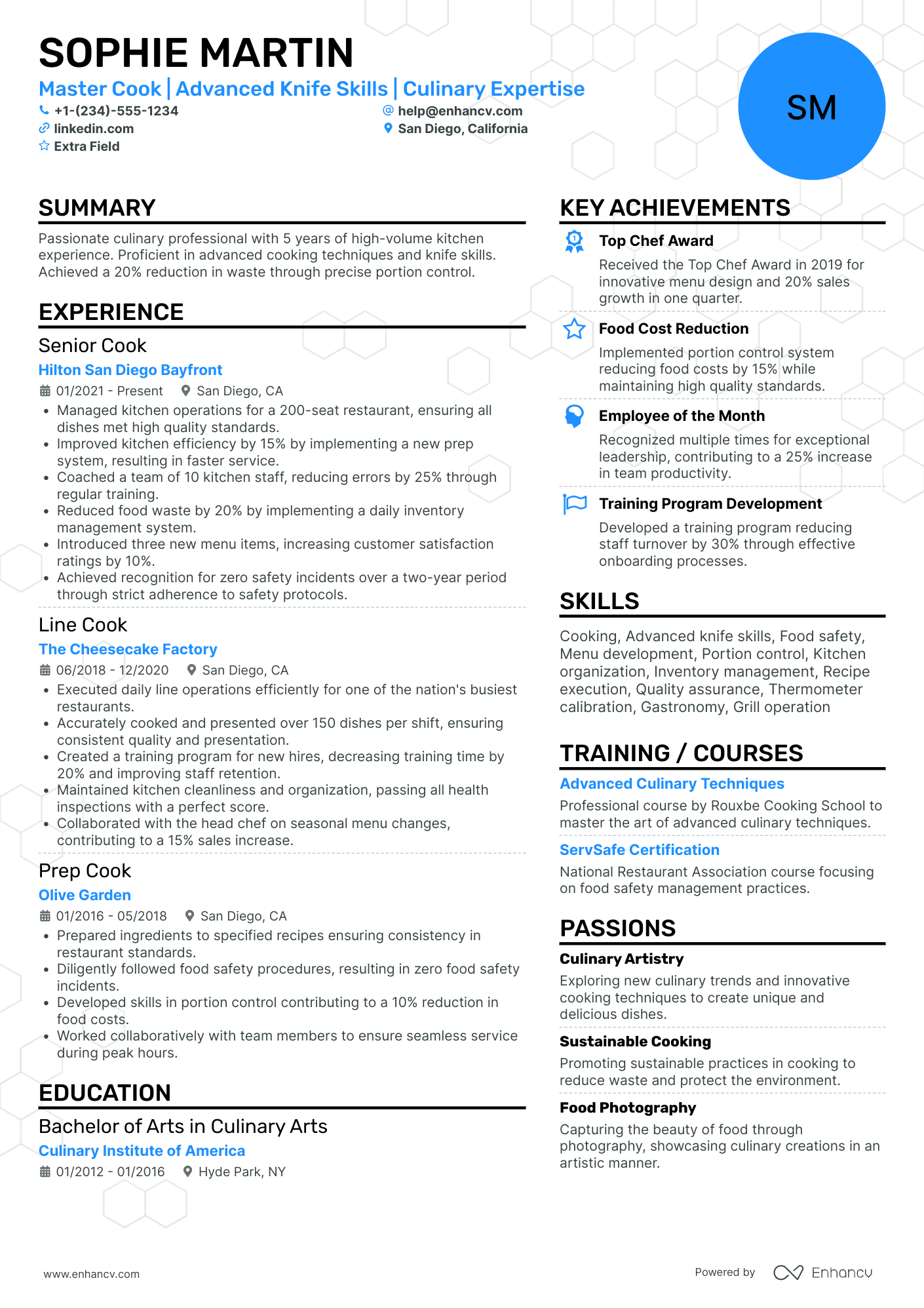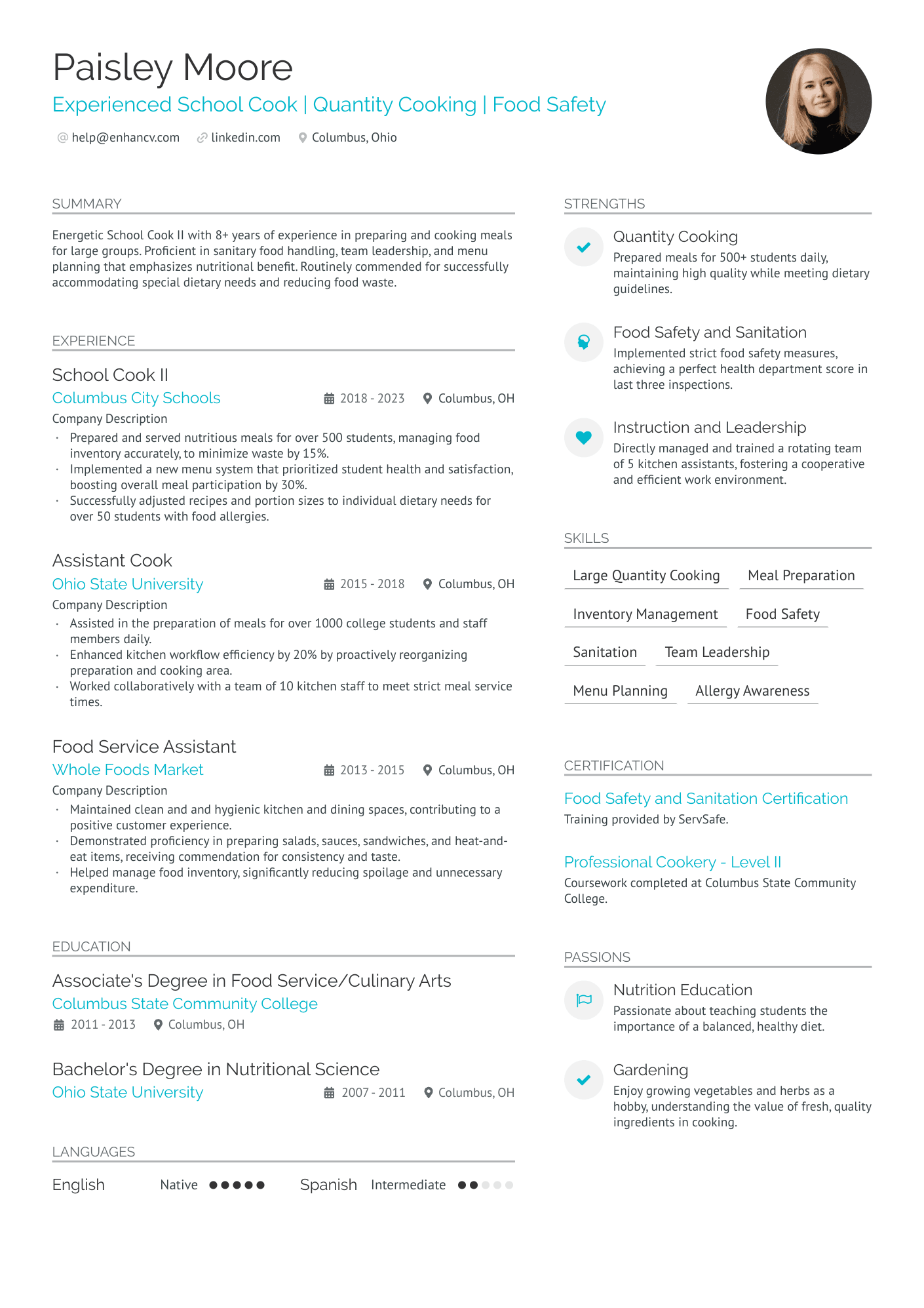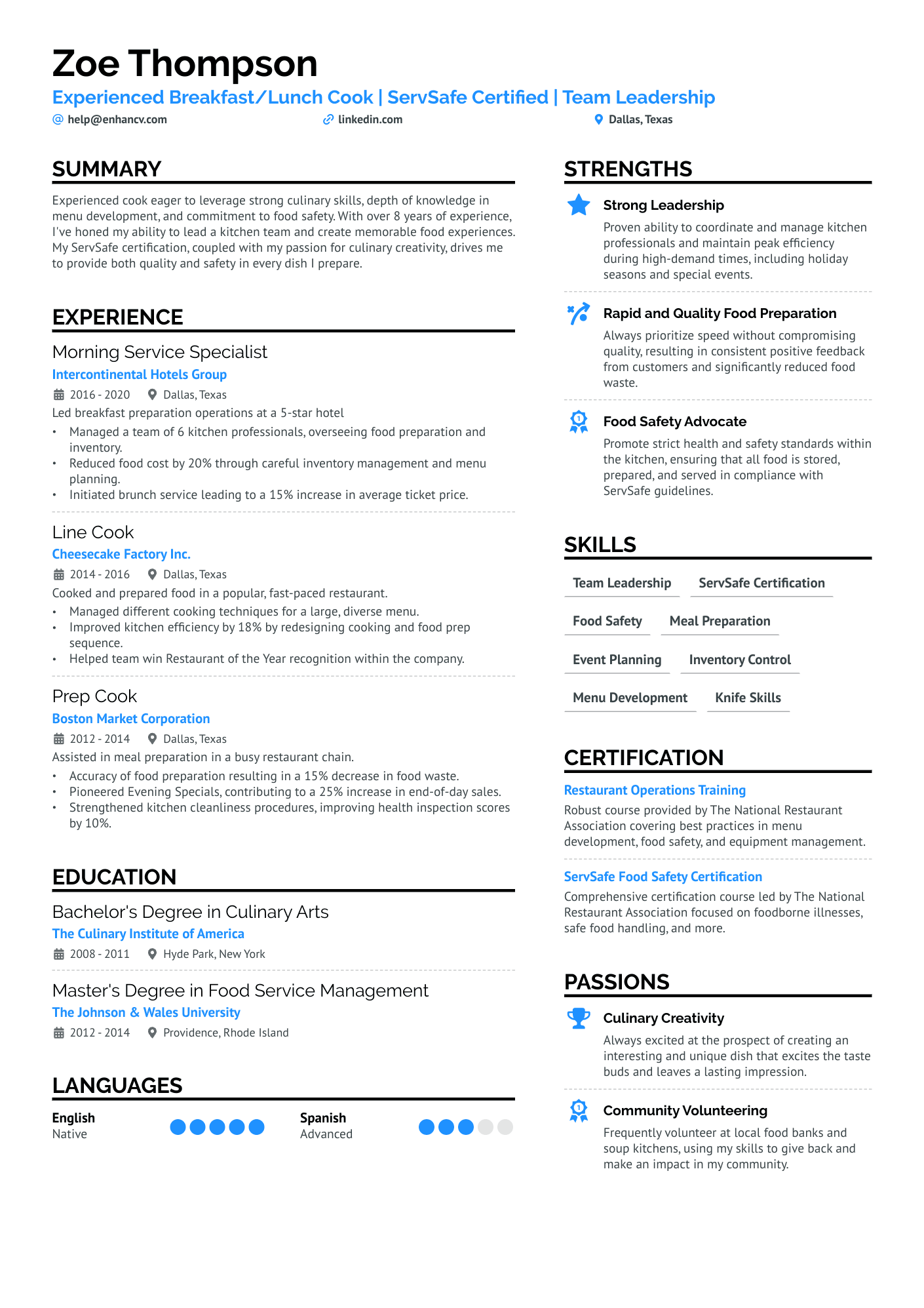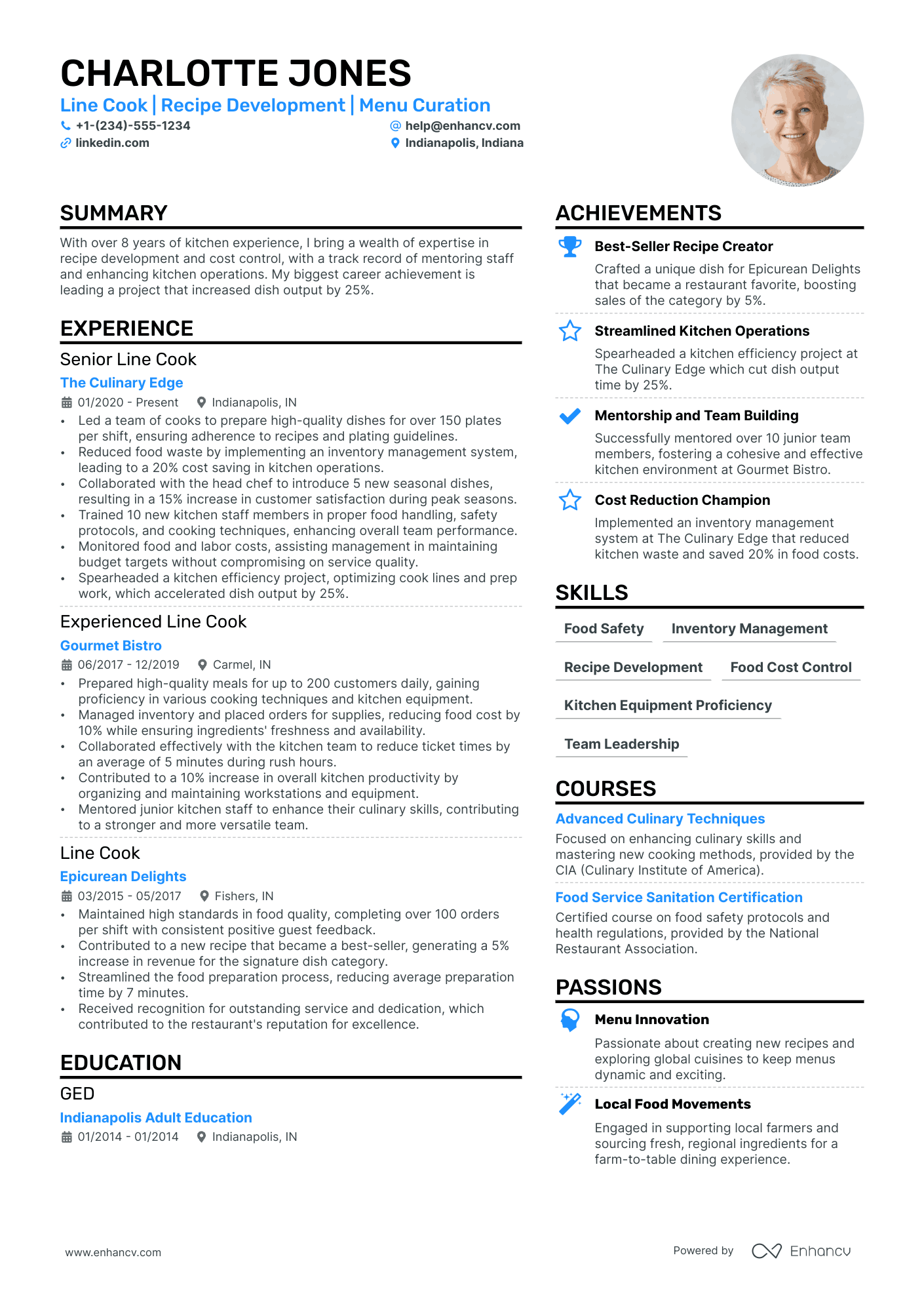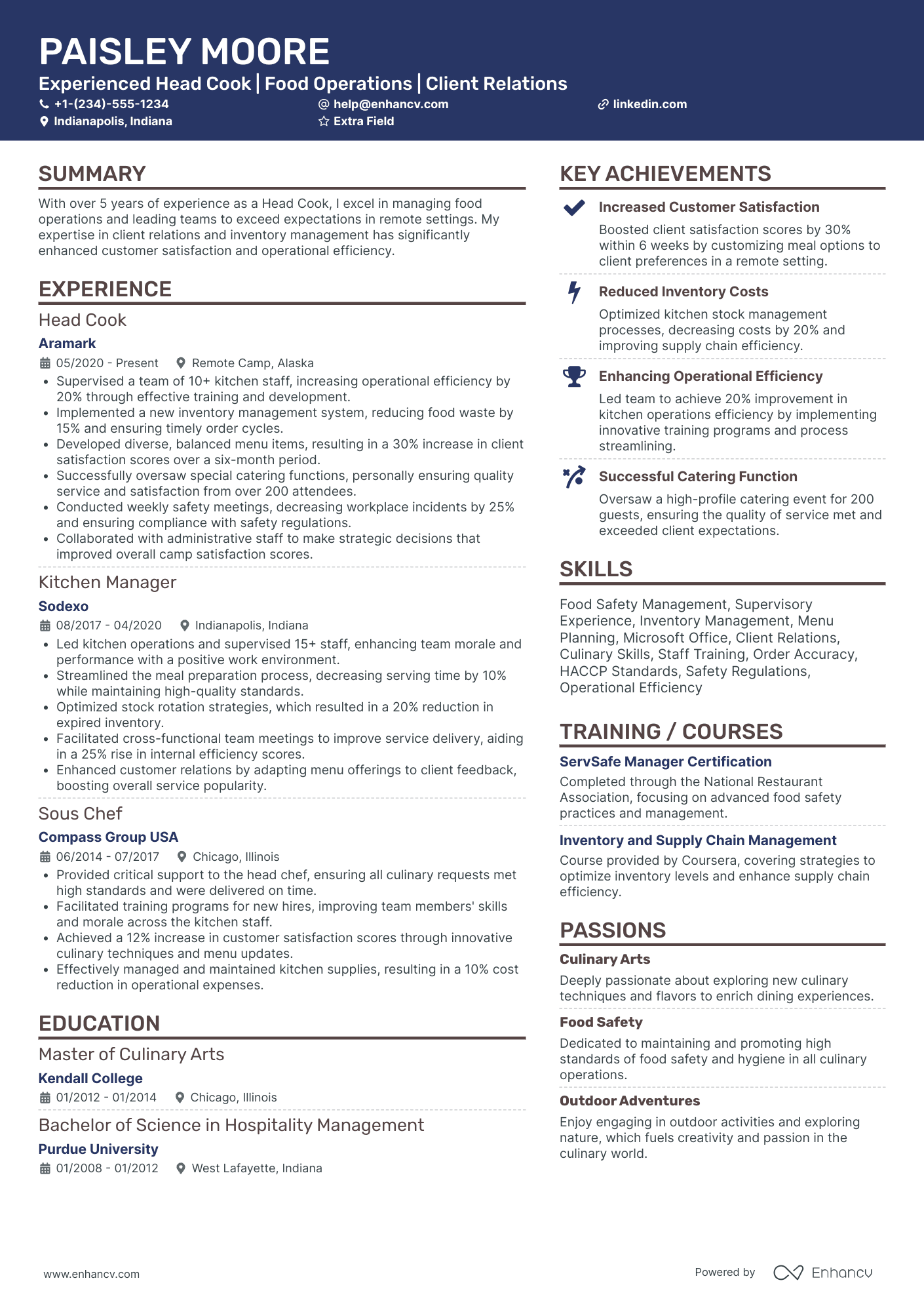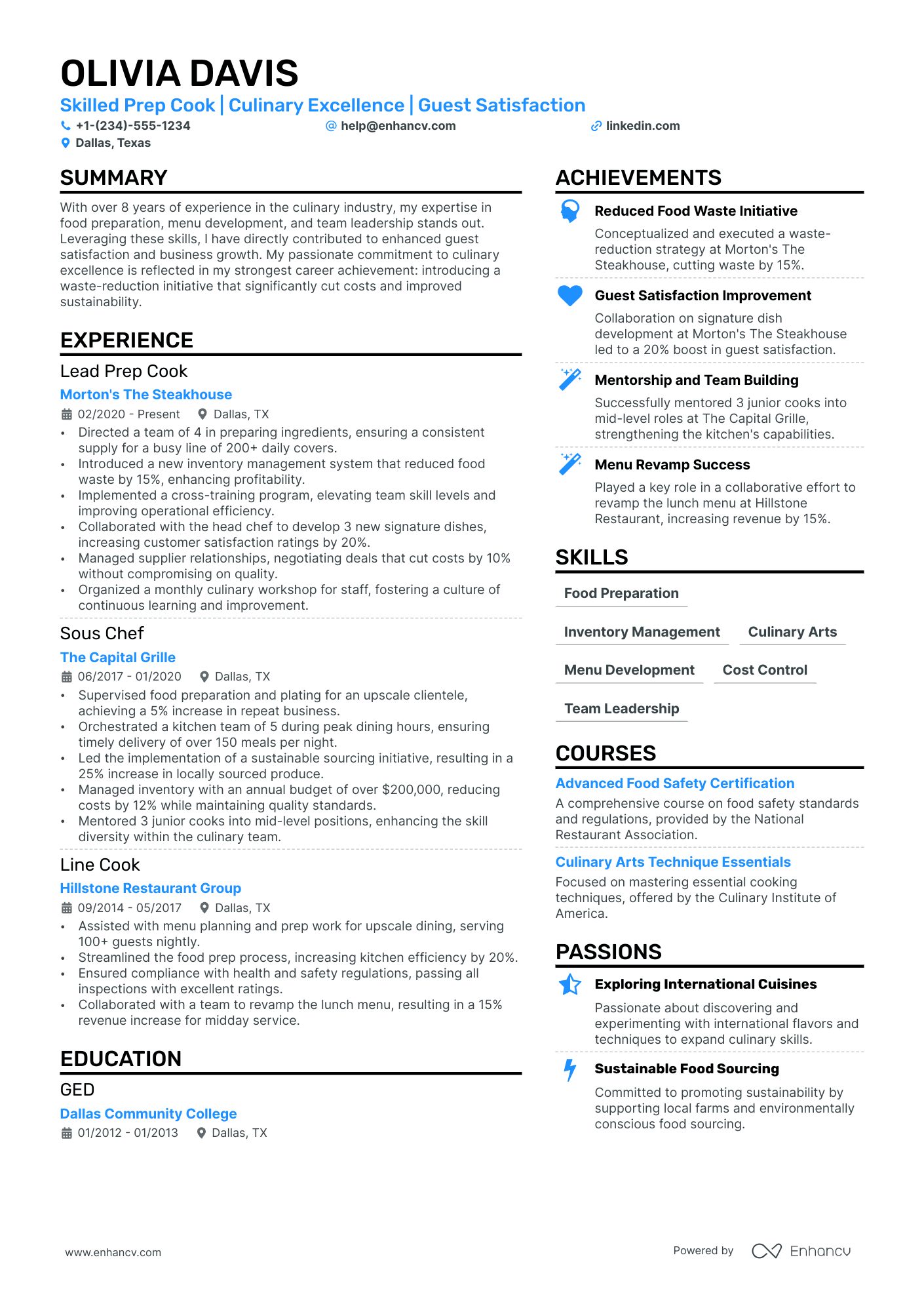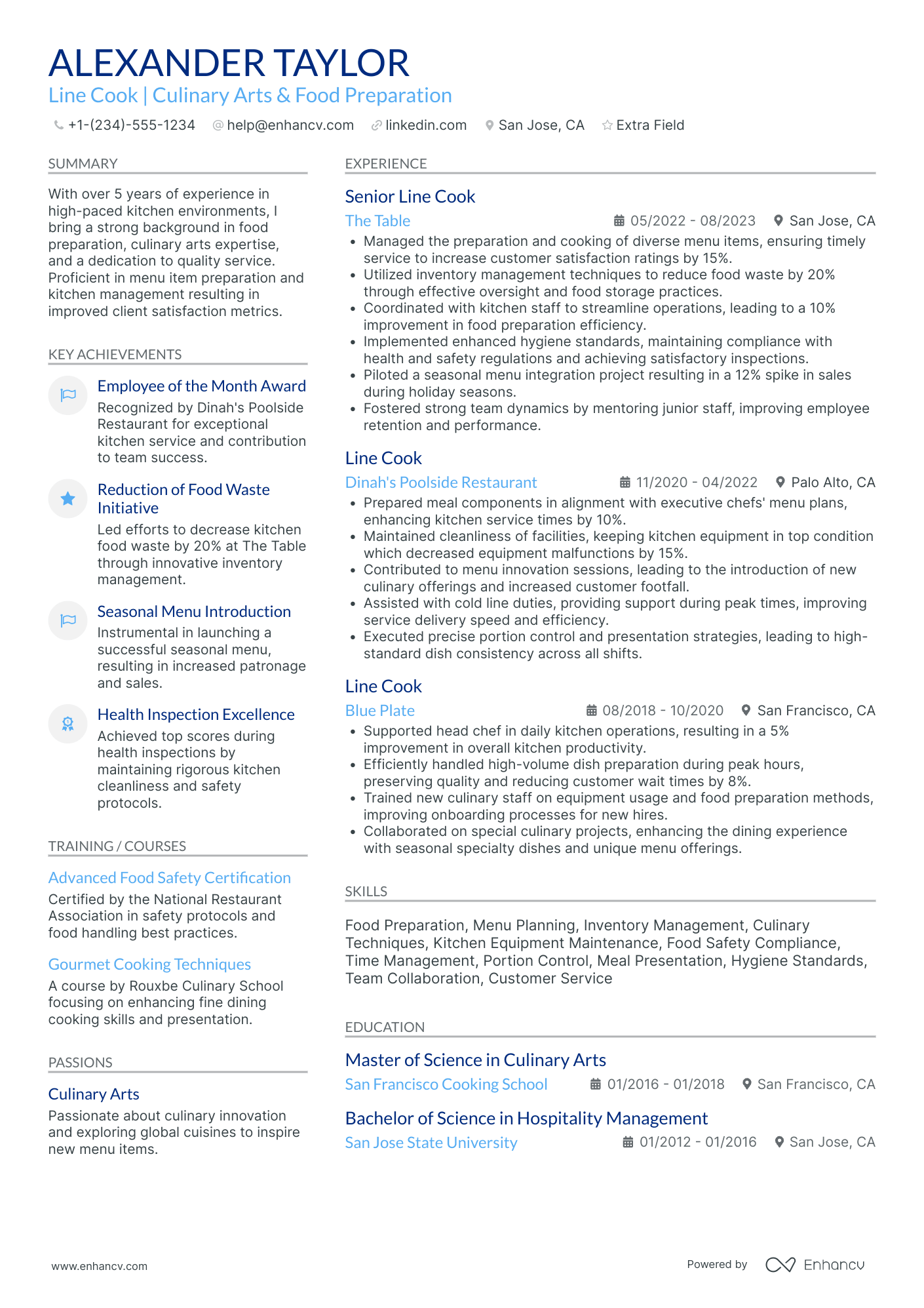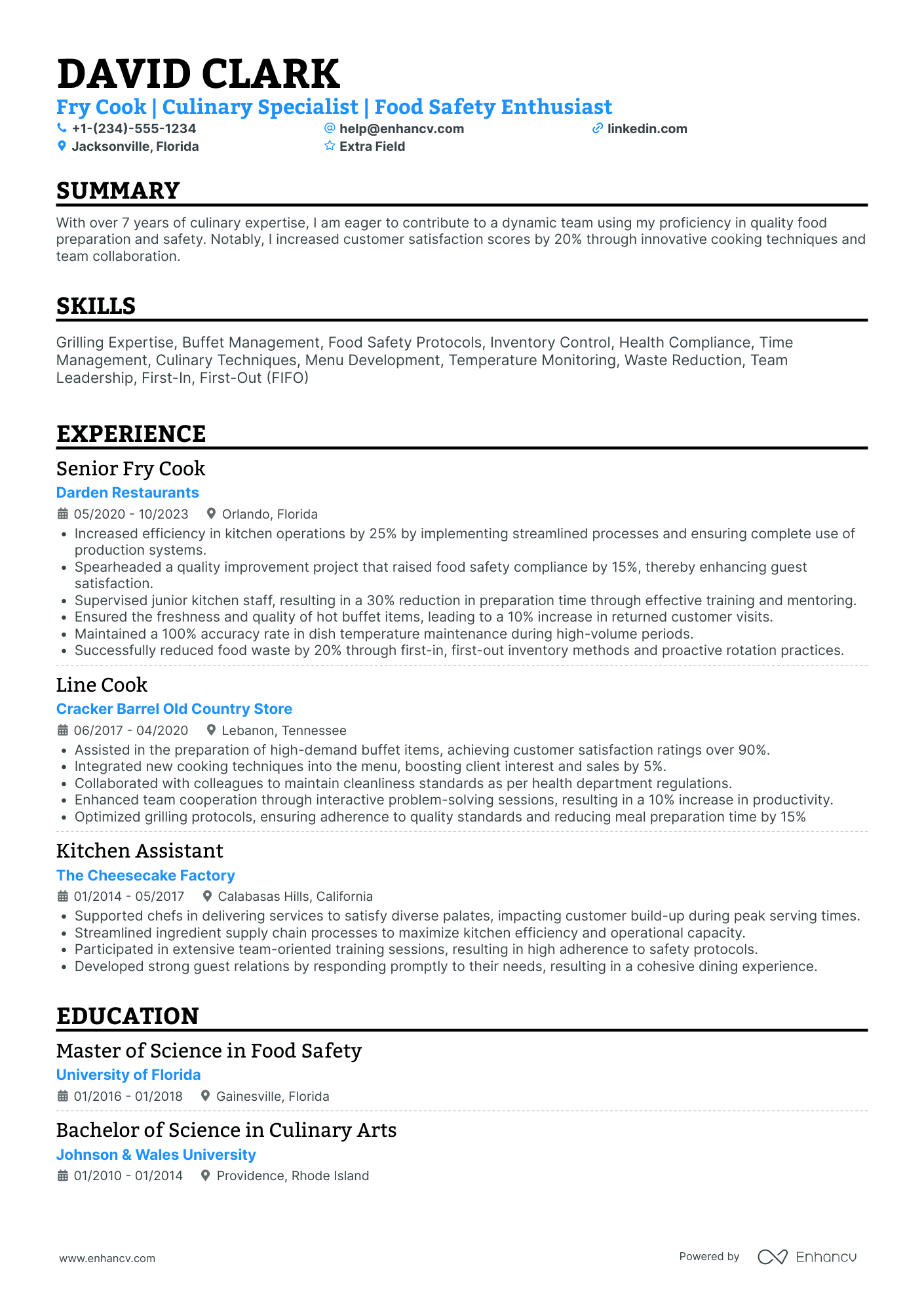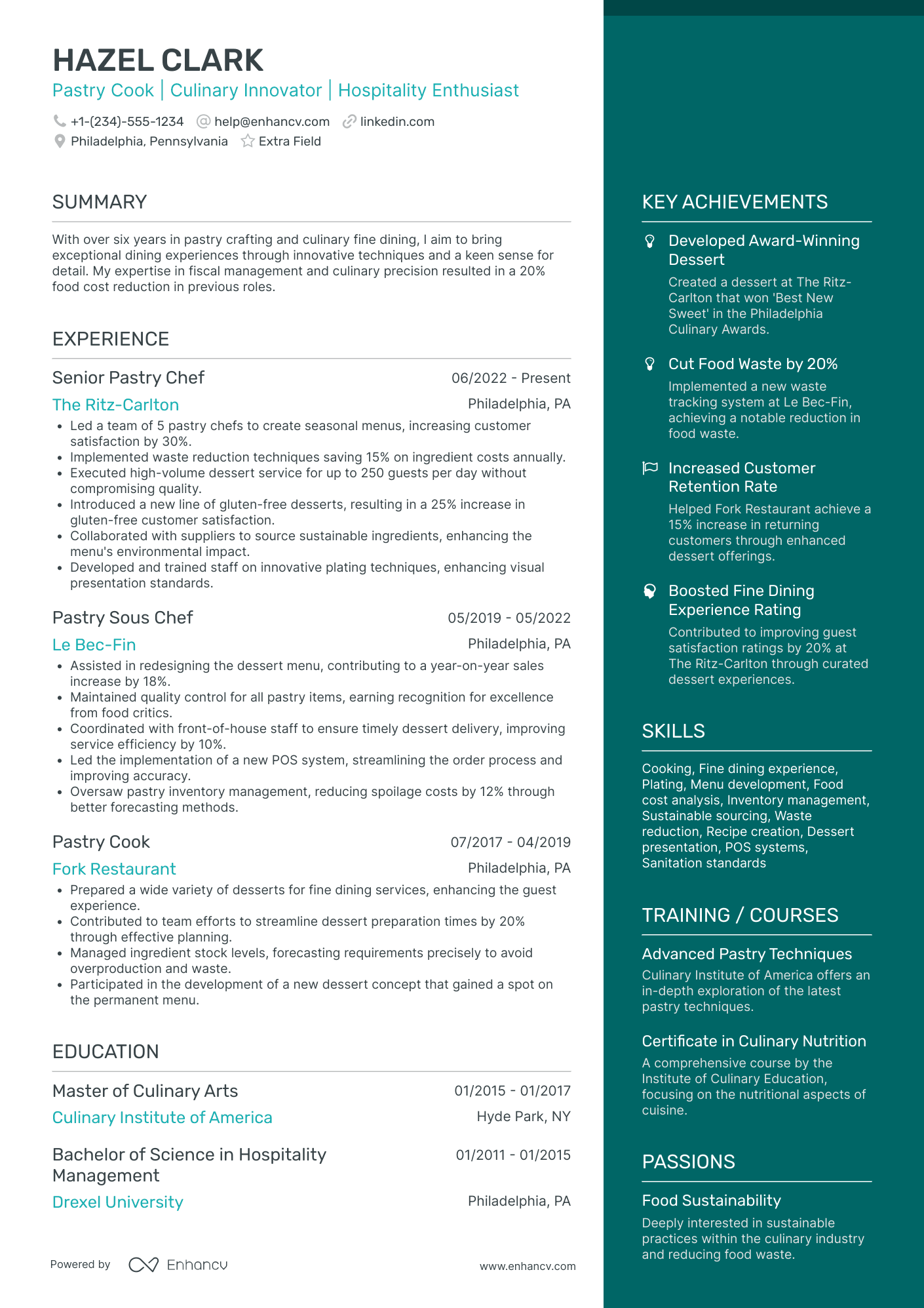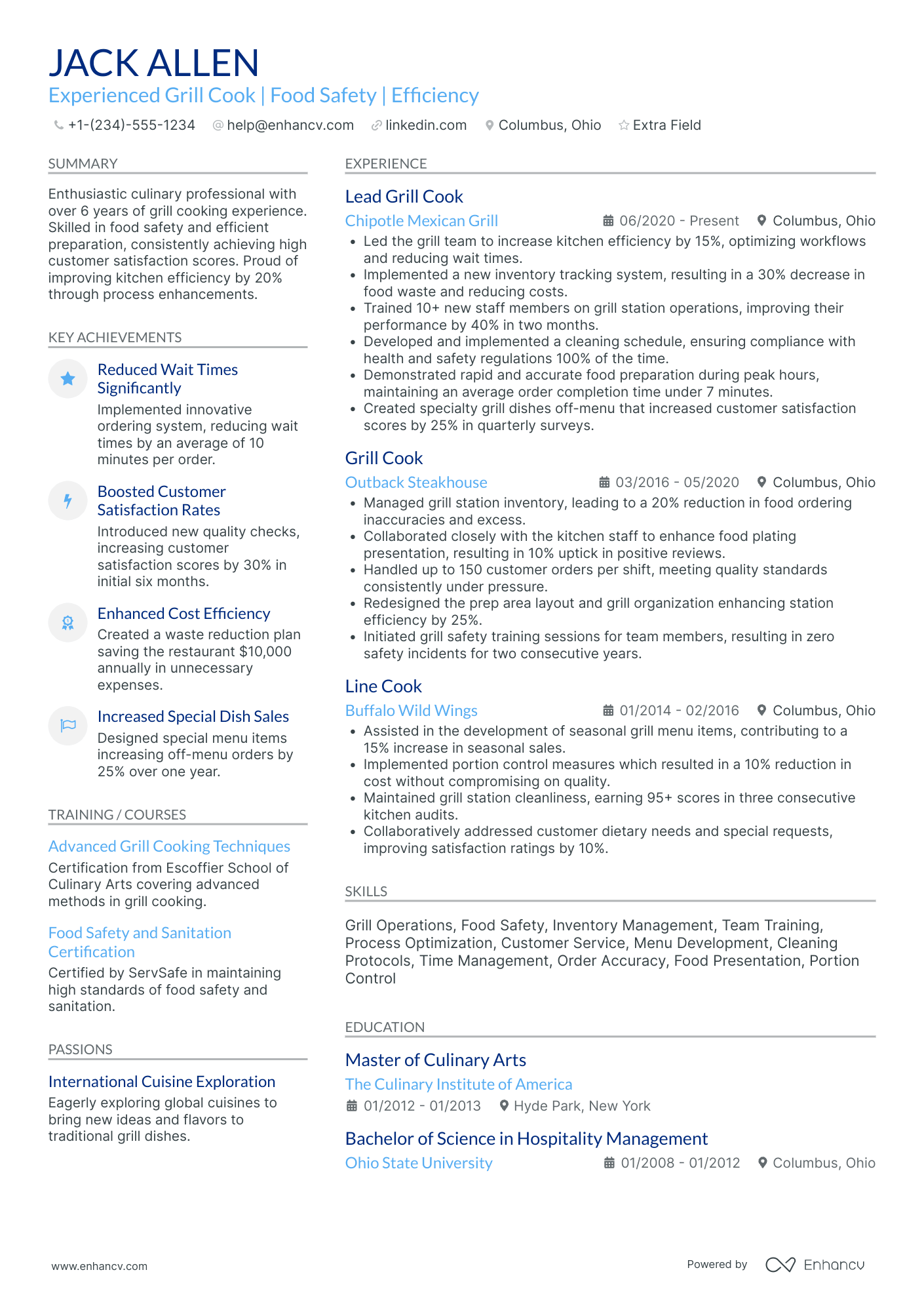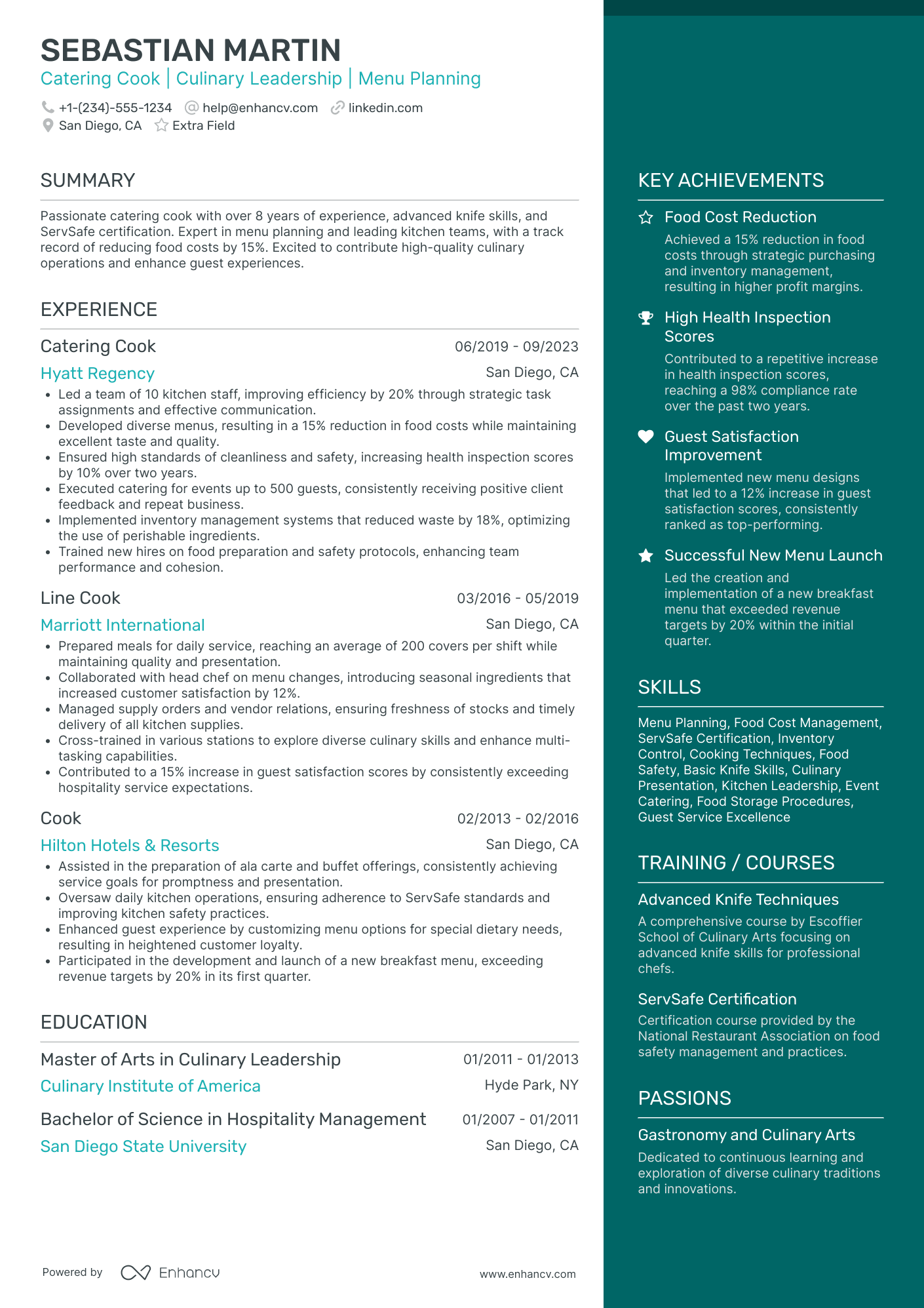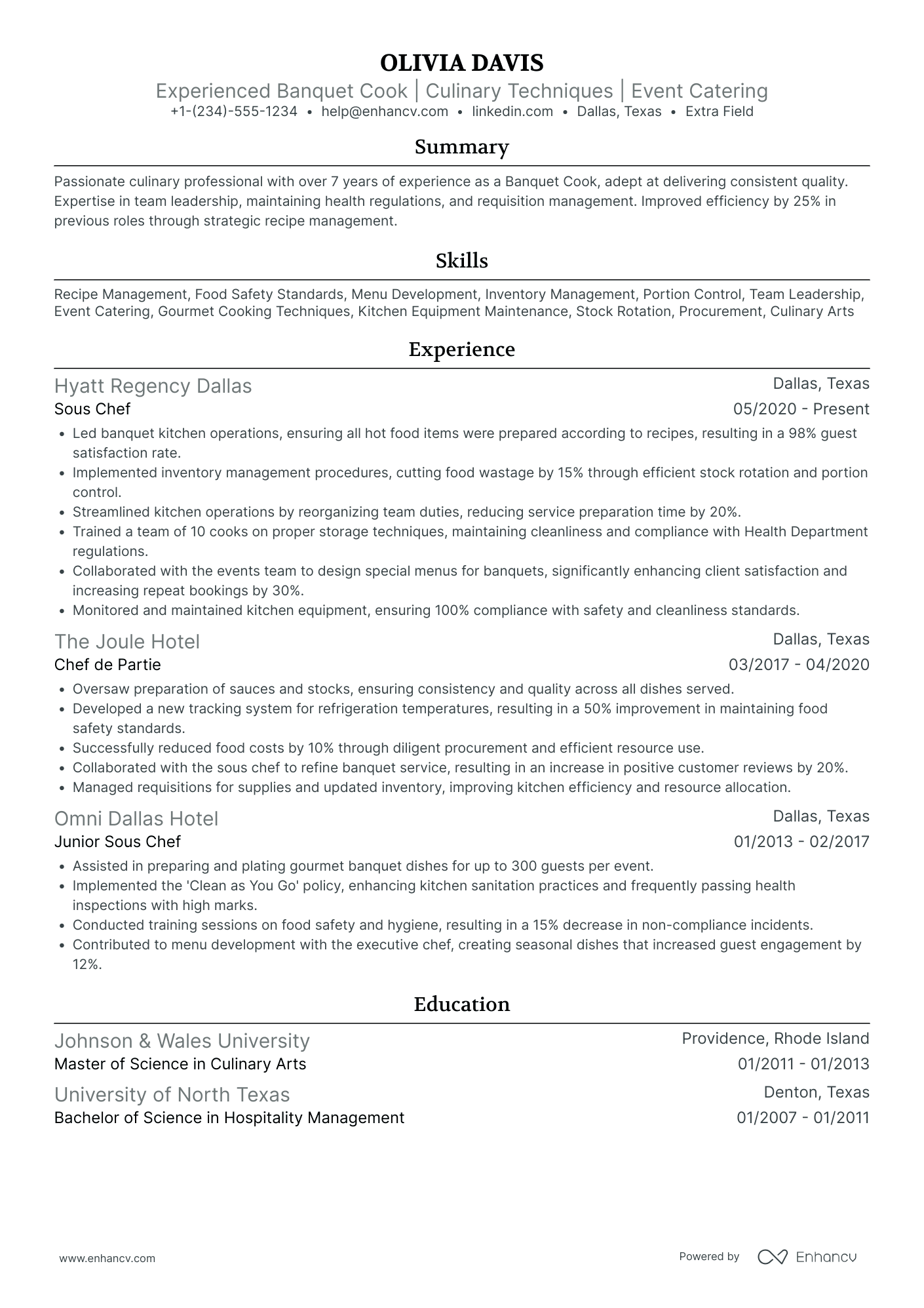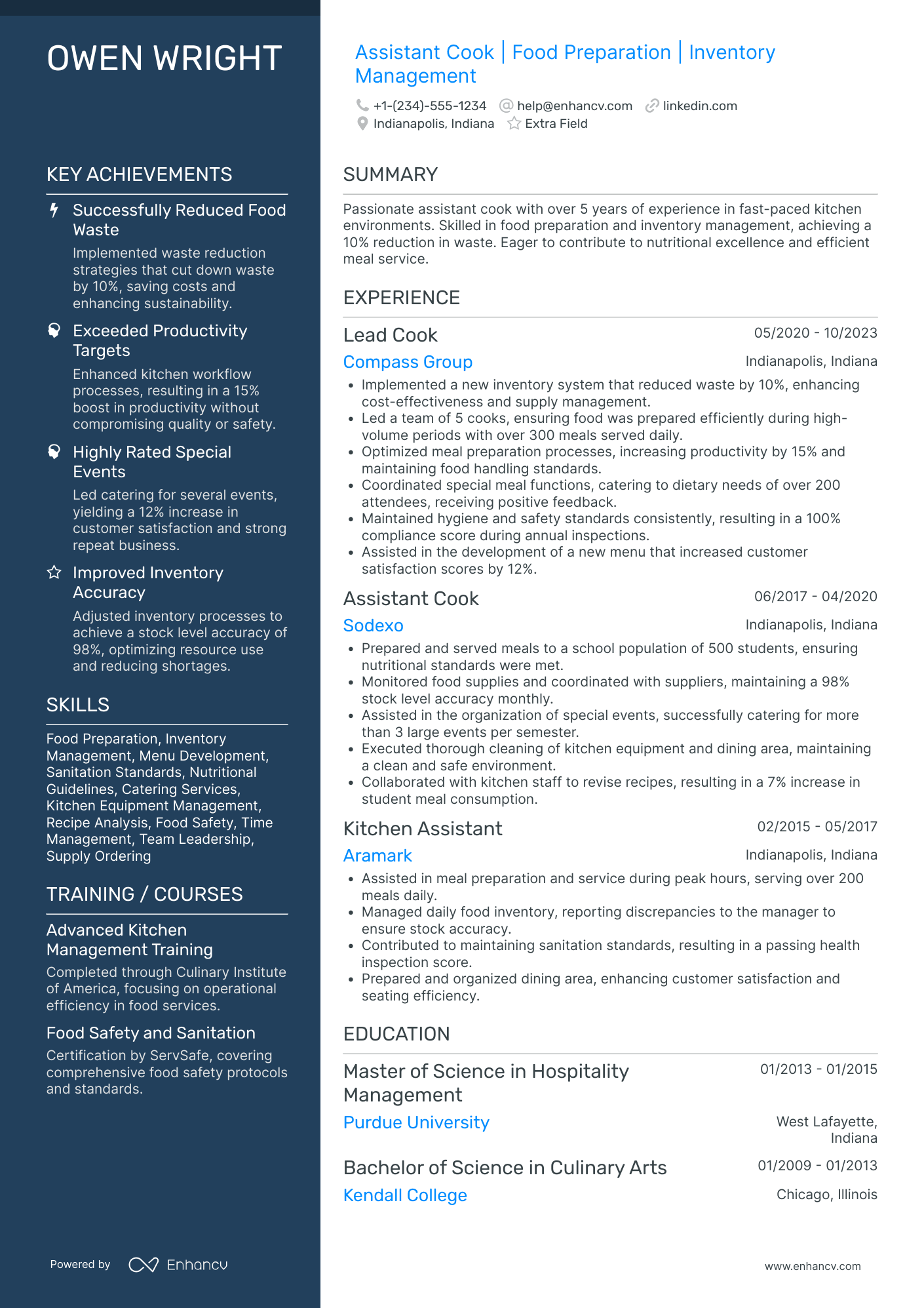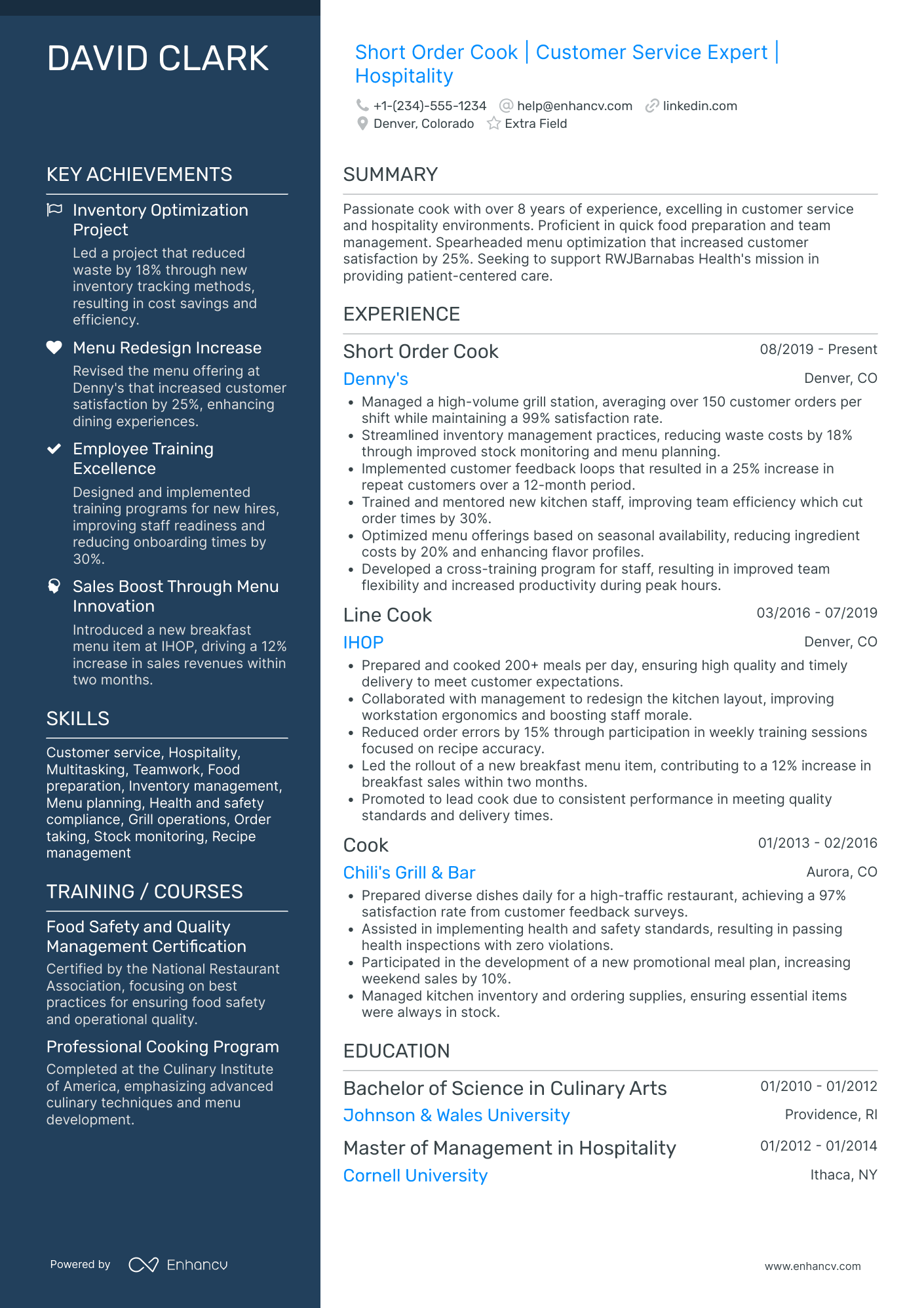Most cook resume submissions fail because they list duties and tools instead of proving service speed, consistency, and safety. That gets filtered by applicant tracking systems and missed in fast scans. Competition is tight, so vague claims cost interviews.
A strong resume shows what you improved and delivered. Knowing how to make your resume stand out means you should highlight ticket-time reductions, higher covers per shift, lower food waste, fewer returns, consistent prep accuracy, and strong health inspection results. Quantify volume, stations covered, and reliability during peak service.
Key takeaways
- Quantify ticket times, covers served, waste reduction, and food costs to prove kitchen impact.
- Tailor each resume to the job posting's cuisine, equipment, and safety requirements.
- Use reverse-chronological format for experienced cooks and hybrid format for career changers.
- Place certifications like ServSafe and HACCP where they're easy to spot and verify.
- Write experience bullets that show ownership, execution method, and measurable results.
- Enhancv's Bullet Point Generator helps turn routine kitchen duties into recruiter-ready statements.
- Stop using AI once your resume accurately reflects real experience—never fabricate claims.
Job market snapshot for cooks
We analyzed 16,923 recent cook job ads across major US job boards. These numbers help you understand role specialization trends, employer expectations, industry demand at a glance.
What level of experience employers are looking for cooks
| Years of Experience | Percentage found in job ads |
|---|---|
| 1–2 years | 7.9% (1332) |
| 3–4 years | 2.5% (423) |
| 5–6 years | 0.3% (54) |
| 7–8 years | 0.0% (1) |
| 9–10 years | 0.0% (5) |
| 10+ years | 15.9% (2695) |
| Not specified | 69.8% (11818) |
Cook ads by area of specialization (industry)
| Industry (Area) | Percentage found in job ads |
|---|---|
| Healthcare | 38.4% (6495) |
| Finance & Banking | 31.5% (5333) |
| Travel & Hospitality | 11.0% (1865) |
| Retail & E-commerce | 7.7% (1295) |
| Education | 5.2% (885) |
| Manufacturing | 2.8% (474) |
| Government | 1.4% (245) |
| Media & Entertainment | 1.0% (170) |
| Energy | 0.3% (59) |
| Other | 0.2% (40) |
Top companies hiring cooks
| Company | Percentage found in job ads |
|---|---|
| Pizza Hut | 7.3% (1228) |
| Compass Group USA Inc | 7.0% (1178) |
| Chilli's | 5.9% (1005) |
| Sodexo S A | 5.3% (894) |
| Taco Bell | 4.3% (728) |
| Healthcare Services Group | 3.2% (539) |
| Longhorn Steakhouse | 3.0% (514) |
| Aramark Corp. | 2.9% (484) |
| Landry's | 2.2% (376) |
| First Watch Restaurants | 1.8% (311) |
Role overview stats
These tables show the most common responsibilities and employment types for cook roles. Use them to align your resume with what employers expect and to understand how the role is structured across the market.
Day-to-day activities and top responsibilities for a cook
| Responsibility | Percentage found in job ads |
|---|---|
| Food safety | 14.2% (2399) |
| Sanitation | 13.3% (2258) |
| Food preparation | 10.4% (1766) |
| Cooking | 5.6% (954) |
| Food handling | 4.8% (811) |
| Inventory management | 3.7% (628) |
| Servsafe | 3.5% (594) |
| Knife skills | 2.8% (481) |
| Food handler certification | 2.7% (464) |
| Cooking methods | 2.5% (423) |
| Customer service | 2.2% (374) |
| Kitchen equipment | 1.9% (329) |
How to format a cook resume
Recruiters reviewing cook resumes prioritize hands-on kitchen skills, food safety knowledge, and the ability to work efficiently under pressure in fast-paced environments. A clean, well-structured resume format ensures these signals—along with relevant experience and certifications—are immediately visible to both hiring managers and applicant tracking systems.
I have significant experience in this role—which format should I use?
Use a reverse-chronological format to put your strongest and most recent kitchen experience front and center. Do:
- Lead with your most recent positions, highlighting the type of cuisine, kitchen size, and volume of covers you handled per service.
- Feature role-specific skills such as knife techniques, station management, inventory control, and familiarity with health and safety standards (ServSafe, HACCP).
- Quantify your contributions with measurable outcomes tied to efficiency, waste reduction, or menu execution.
I'm junior or switching into this role—what format works best?
A hybrid format works best because it lets you lead with relevant kitchen skills while still showing a clear timeline of any work experience you have. Do:
- Place a dedicated skills section near the top of your resume, listing food preparation techniques, equipment proficiency, and any food safety certifications.
- Include culinary school projects, externships, catering gigs, or volunteer kitchen work to demonstrate hands-on experience, even if it wasn't a traditional employment role.
- Connect every skill or experience to a specific action and its result so hiring managers can see your potential impact.
Why not use a functional resume?
A functional resume strips away the timeline of your kitchen experience, making it difficult for hiring managers to assess where and how you developed your cooking skills—context that matters even for entry-level and mid-level cook roles.
- A functional format may make sense if you're transitioning from a home-based catering business or food truck into a restaurant kitchen and need to frame non-traditional experience around transferable skills.
- It can also work if you have a significant gap in employment but spent that time completing culinary coursework, earning certifications, or staging at restaurants.
Once your format sets the stage for easy reading, the next step is filling it with the right sections to showcase your qualifications.
What sections should go on a cook resume
Recruiters expect you to present your kitchen experience, core culinary skills, and food safety qualifications in a clean, easy-to-scan format. Understanding which resume sections to include ensures you don't miss anything critical.
Use this structure for maximum clarity:
- Header
- Summary
- Experience
- Skills
- Projects
- Education
- Certifications
- Optional sections: Awards, Leadership, Languages
Strong experience bullets should emphasize measurable impact, service volume, quality and consistency outcomes, speed, safety compliance, and cost or waste reduction results.
Is your resume good enough?
Drop your resume here or choose a file. PDF & DOCX only. Max 2MB file size.
With your resume’s key components in place, the next step is to write the experience section so it supports each part with clear, relevant details.
How to write your cook resume experience
The experience section is where you prove you can deliver in a working kitchen—through the dishes you've prepared, the techniques and equipment you've used, and the measurable results you've produced. Hiring managers prioritize demonstrated impact over descriptive task lists, so focus on what you accomplished rather than what your job description said. Building a targeted resume for each application ensures your experience speaks directly to what the employer needs.
Each entry should include:
- Job title
- Company and location (or remote)
- Dates of employment (month and year)
Three to five concise bullet points showing what you owned, how you executed, and what outcomes you delivered:
- Ownership scope: the stations, menu sections, prep processes, or kitchen teams you were directly accountable for as a cook.
- Execution approach: the cooking techniques, kitchen equipment, food safety protocols, or inventory methods you used to plan and deliver consistent results.
- Value improved: changes to food quality, prep speed, waste reduction, health and safety compliance, or plate consistency tied to your work as a cook.
- Collaboration context: how you coordinated with sous chefs, front-of-house staff, suppliers, or other line cooks to keep service running smoothly.
- Impact delivered: outcomes expressed through results such as faster ticket times, reduced food costs, improved guest satisfaction, or higher kitchen output rather than a list of daily duties.
Experience bullet formula
A cook experience example
✅ Right example - modern, quantified, specific.
Line Cook
Harbor & Hearth Bistro | Portland, OR
2022–Present
High-volume, farm-to-table bistro serving two hundred to three hundred covers nightly with a seasonal, scratch-made menu.
- Executed grill, sauté, and garde manger stations using HACCP (Hazard Analysis and Critical Control Points) logs and digital thermometers; cut ticket times from fourteen to eleven minutes during peak service.
- Standardized prep with recipe cards, calibrated scales, and FIFO (first in, first out) labeling; reduced food waste by 18% and improved portion consistency, lowering weekly protein variance by 12%.
- Coordinated service flow with the executive chef, servers, and expo via kitchen display system screens and call-backs; increased on-time ticket completion from 86% to 94% across weekend shifts.
- Led daily sanitation and allergen controls using three-compartment sink procedures, quaternary sanitizer test strips, and color-coded boards; passed two health inspections with zero critical violations.
- Trained five new cooks on knife skills, station setup, and mise en place checklists; reduced ramp-up time to independent station coverage from four weeks to three weeks.
Now that you've seen how a strong experience section looks in practice, let's break down how to tailor each element to match the specific job you're applying for.
How to tailor your cook resume experience
Recruiters evaluate cook resumes through both manual review and applicant tracking systems, so tailoring your resume to the job description increases your chances of landing an interview. Tailoring means adjusting how you present your real skills to match what each employer prioritizes.
Ways to tailor your cook experience:
- Match specific cooking methods or techniques listed in the posting.
- Use the exact terminology for cuisine styles the employer names.
- Mirror food safety standards or certifications the job requires.
- Include experience with kitchen equipment or systems they reference.
- Highlight volume or service style that fits their operation.
- Emphasize compliance with health codes or sanitation protocols mentioned.
- Reference team coordination or brigade structures they describe.
- Align your prep workflows with their stated kitchen processes.
Tailoring means framing your actual accomplishments to reflect the employer's stated priorities, not forcing disconnected keywords into your experience section.
Resume tailoring examples for cook
| Job description excerpt | Untailored | Tailored |
|---|---|---|
| Prepare breakfast and lunch dishes in a fast-paced, 200-seat diner using flat-top grills and fryers while maintaining ticket times under 8 minutes. | Cooked food for customers in a busy restaurant. | Prepared 150+ breakfast and lunch orders daily on flat-top grills and commercial fryers in a 200-seat diner, consistently keeping ticket times under 7 minutes during peak service. |
| Execute Mediterranean-inspired menu items using scratch-made sauces, fresh pasta, and wood-fired cooking techniques under the direction of the executive chef. | Made various dishes and helped in the kitchen as needed. | Produced scratch-made romesco, tahini, and herb-based sauces daily and cooked fresh pasta and proteins using wood-fired oven techniques, executing a 24-item Mediterranean menu under the executive chef's direction. |
| Maintain strict allergen protocols and ServSafe standards while managing prep lists and rotating inventory using FIFO in a high-volume hotel banquet kitchen serving 500+ guests per event. | Followed food safety rules and kept the kitchen organized. | Managed daily prep lists and FIFO inventory rotation for a hotel banquet kitchen serving 500+ guests per event, enforcing ServSafe standards and allergen protocols that contributed to zero cross-contamination incidents over 18 months. |
Once you’ve aligned your experience with the role’s needs, the next step is to quantify your cook achievements so hiring managers can quickly see the impact you delivered.
How to quantify your cook achievements
Quantifying your achievements proves you deliver consistent food, faster service, and safer kitchens. Focus on ticket times, volume served, food cost, waste, health-code compliance, and guest satisfaction.
Quantifying examples for cook
| Metric | Example |
|---|---|
| Speed | "Cut average ticket time from 14 minutes to 10 minutes during dinner rush by reorganizing the line and pre-portioning proteins." |
| Volume | "Prepared and plated 220 to 260 covers per night on a five-person line while maintaining station readiness for every service." |
| Food cost | "Reduced weekly food cost by 3.2% by tightening portion control with digital scales and updating prep sheets for high-cost items." |
| Waste reduction | "Lowered prep waste by 18% by switching to first-in, first-out labeling, repurposing trim for stocks, and tracking spoilage daily." |
| Compliance | "Earned a 98 health inspection score by standardizing temperature logs, enforcing allergen procedures, and keeping hot holding above 135°F." |
Turn vague job duties into measurable, recruiter-ready resume bullets in seconds with Enhancv's Bullet Point Generator.
Once you've crafted strong bullet points for your experience section, you'll want to apply that same precision to presenting your hard and soft skills.
How to list your hard and soft skills on a cook resume
Your skills section shows you can execute recipes safely and consistently, and recruiters and ATS scan it to match you to the kitchen's needs—aim for a strong mix of technical kitchen skills and role-specific soft skills. cook roles require a blend of:
- Product strategy and discovery skills: Menu planning, specials development, and ingredient sourcing aligned to guest demand.
- Data, analytics, and experimentation skills: Portion control, waste tracking, and recipe testing to improve consistency and cost.
- Delivery, execution, and go-to-market discipline: Line execution, prep systems, and service readiness for peak volume.
- Soft skills: Clear communication, teamwork, and calm decision-making during service.
Your skills section should be:
- Scannable (bullet-style grouping).
- Relevant to the job post.
- Backed by proof in experience bullets.
- Updated with current tools.
Place your skills section:
- Above experience if you're junior or switching careers.
- Below experience if you're mid/senior with strong achievements.
Hard skills
Your hard skills demonstrate technical proficiency in the kitchen:
- Knife skills, cuts, filleting
- Mise en place systems
- Line cooking, station coverage
- Recipe execution, batch scaling
- Food safety, HACCP, ServSafe
- Temperature logs, cooling logs
- Cross-contamination controls, allergen protocols
- Inventory rotation, FIFO
- Portion control, yield management
- Prep lists, par levels
- Commercial kitchen equipment: combi oven, flat-top, fryer
- Basic cost control, food waste tracking
Soft skills
Your soft skills show how you perform under pressure and collaborate with your team:
- Communicate tickets clearly
- Coordinate with expo and servers
- Prioritize tasks during rush
- Stay calm under pressure
- Follow standards without shortcuts
- Take ownership of station readiness
- Ask clarifying questions early
- Give and receive line feedback
- Adapt pacing to volume changes
- Resolve issues fast during service
- Support teammates across stations
- Maintain focus in repetitive prep
How to show your cook skills in context
Skills shouldn't live only in a bulleted list on your resume.
They should be demonstrated in:
- Your summary (high-level professional identity)
- Your experience (proof through outcomes)
Here's what that looks like in practice. You can explore more ways to present resume skills effectively across different sections.
Summary example
Senior cook with 10 years in high-volume restaurant kitchens. Skilled in French technique, sous vide, and HACCP protocols. Reduced food waste by 18% through precise inventory management and collaborative menu planning with culinary teams.
- Reflects senior-level expertise immediately
- Names industry-relevant tools and methods
- Highlights a measurable cost-saving outcome
- Shows teamwork through collaborative planning
Experience example
Senior Line Cook
The Copper Elm | Portland, OR
March 2019–June 2024
- Managed a six-burner station during 300-cover dinner services, cutting average ticket times by 22% through streamlined mise en place workflows.
- Collaborated with the pastry team and sous chef to develop 12 seasonal menu items, increasing repeat guest visits by 15%.
- Implemented FIFO inventory rotation using MarketMan, reducing weekly food spoilage costs by $400 across all protein stations.
- Every bullet contains a measurable outcome.
- Skills appear naturally within real achievements.
Once you’ve demonstrated your culinary abilities through relevant examples, the next step is translating that approach into a cook resume when you have no experience.
How do I write a cook resume with no experience
Even without full-time experience, you can demonstrate readiness through:
- Culinary school lab cooking
- Food handler certification training
- Catering gigs and event prep
- Volunteer kitchen meal service
- Home meal prep for groups
- Farmers market food stall help
- ServSafe practice and sanitation drills
- Meal prep for meal delivery
If you're building a resume without work experience, focus on:
- Food safety and sanitation proof
- Knife skills and basic prep
- Station setup, labeling, storage
- Speed, yield, and waste tracking
Resume format tip for entry-level cook
Use a combination resume format because it highlights kitchen skills and training first, while still listing limited experience in a clear timeline. Do:
- Put skills above experience section.
- List tools, stations, and methods.
- Add certifications with issue dates.
- Quantify volume, speed, and waste.
- Describe prep tasks with outcomes.
- Volunteered as cook in community kitchen, prepped and cooked 120 portions using knife cuts, batch cooking, and labeling; reduced waste by 15% through FIFO rotation.
Even without professional kitchen experience, your education section can demonstrate relevant knowledge and training that strengthens your candidacy.
How to list your education on a cook resume
Your education section helps hiring managers confirm you have foundational knowledge in food preparation, safety, and kitchen operations relevant to the cook role.
Include:
- Degree name
- Institution
- Location
- Graduation year
- Relevant coursework (for juniors or entry-level candidates)
- Honors & GPA (if 3.5 or higher)
Skip month and day details—list the graduation year only.
Here's a strong education entry tailored for a cook resume:
Example education entry
Associate of Applied Science in Culinary Arts
Johnson & Wales University, Providence, RI
Graduated 2022
GPA: 3.7
- Relevant coursework: Food Safety and Sanitation, Nutrition Fundamentals, Classical Cooking Techniques, Kitchen Management
- Honors: Dean's List, 2021–2022
How to list your certifications on a cook resume
Certifications show a cook's commitment to learning, proficiency with kitchen tools and safety practices, and alignment with industry standards employers trust.
Include:
- Certificate name
- Issuing organization
- Year
- Optional: credential ID or URL
- Put certifications below education when your degree or culinary program is recent and your certifications mainly support it.
- Put certifications above education when they are recent, required for the role, or more relevant than older education.
Best certifications for your cook resume
ServSafe Food Handler ServSafe Manager ServSafe Allergens National Registry of Food Safety Professionals Food Safety Manager Certification American Culinary Federation Certified Culinarian American Culinary Federation Certified Sous Chef Hazard Analysis and Critical Control Points Certification
Once you’ve included your credentials where hiring managers can quickly verify them, shift to writing your cook resume summary to highlight how those qualifications support the value you bring.
How to write your cook resume summary
Your resume summary is the first thing a recruiter reads. A sharp, specific opening can set you apart from dozens of other cook applicants.
Keep it to three to four lines, with:
- Your current title and total years of cooking experience.
- The type of cuisine, kitchen environment, or dining setting you know best.
- Core skills such as knife technique, grill work, food safety, or inventory management.
- One or two measurable wins, like reducing prep time or cutting food waste.
- Soft skills tied to real results, such as teamwork that improved ticket times.
PRO TIP
At the cook level, lead with hands-on skills and specific kitchen contributions. Highlight measurable results, even small ones. Avoid vague phrases like "passionate team player" or "hard worker." Recruiters want proof of what you've done, not personality summaries.
Example summary for a cook
Line cook with three years of experience in high-volume Italian kitchens. Skilled in sauté, grill, and prep stations. Reduced daily food waste by 15% through improved portioning and inventory tracking.
Optimize your resume summary and objective for ATS
Drop your resume here or choose a file.
PDF & DOCX only. Max 2MB file size.
Now that your summary captures the value you bring, make sure the header above it presents your contact details correctly so recruiters can actually reach you.
What to include in a cook resume header
A resume header lists your key contact details and role, helping recruiters spot you fast, trust your profile, and screen you efficiently.
Essential resume header elements
- Full name
- Tailored job title and headline
- Location
- Phone number
- Professional email
- GitHub link
- Portfolio link
A LinkedIn link helps recruiters confirm your work history quickly and supports faster screening.
Don't include a photo on a cook resume unless the role is explicitly front-facing or appearance-dependent.
Keep your header scannable by using one line for contact links and matching your job title to the posting.
Cook resume header
Jordan Rivera
Line Cook | High-volume kitchen, prep, and food safety
Chicago, IL
(312) 555-01XX
jordan.rivera@enhancv.com github.com/jordanrivera jordanrivera.com linkedin.com/in/jordanrivera
Once your header clearly identifies who you are and how to reach you, add optional sections that reinforce your fit and round out your cook resume.
Additional sections for cook resumes
When your core qualifications match other applicants, additional sections help you stand out by showcasing unique strengths relevant to the kitchen.
- Languages
- Certifications and licenses
- Hobbies and interests
- Volunteer experience
- Awards and competitions
- Continuing education
Once you've rounded out your resume with the right supplementary sections, the next step is pairing it with a strong cover letter to make an even greater impression.
Do cook resumes need a cover letter
A cover letter isn't required for most cook roles, but it helps in competitive kitchens or when hiring managers expect one. If you're unsure what a cover letter is and how it supports your application, it's worth learning before you decide to skip one. It can make a difference when your resume needs context or when the role demands a specific style.
Use a cover letter to add useful details your cook resume can't show:
- Explain team fit: Match your experience to the kitchen's pace, service style, and standards, and name the station you can cover confidently.
- Highlight one or two outcomes: Share a prep, service, or inventory improvement with a clear result, like less waste or faster ticket times.
- Show business understanding: Reference the menu, guests, and service model, and connect your strengths to consistency, speed, and food cost control.
- Address transitions: Clarify gaps, a move from catering to line work, or limited restaurant experience, and point to transferable cook skills.
Drop your resume here or choose a file.
PDF & DOCX only. Max 2MB file size.
Once you’ve decided whether to include a cover letter to support your cook application, the next step is using AI to improve your cook resume so it communicates your qualifications clearly and efficiently.
Using AI to improve your cook resume
AI can sharpen your resume's clarity, structure, and impact. It helps refine wording and highlight measurable results. But overuse strips authenticity fast. Once your content reads clearly and fits the role, step away from AI. If you're wondering which AI is best for writing resumes, choose tools that enhance your real experience rather than replace it.
Here are 10 practical prompts to strengthen specific sections of your cook resume:
Tighten your summary
Quantify experience bullets
Strengthen action verbs
Align skills section
Improve certification details
Refine education entries
Clarify project contributions
Cut unnecessary filler
Tailor to job posting
Fix formatting consistency
Conclusion
A strong cook resume shows measurable outcomes, role-specific skills, and a clear structure. It highlights speed, accuracy, food safety, prep volume, and quality standards. It uses simple headings, tight bullets, and consistent formatting that hiring teams can scan fast.
This approach proves you can deliver results on a busy line and in a changing kitchen. It signals readiness for today’s hiring market and the next hiring cycle. With clear numbers and focused skills, your cook resume earns interviews.
